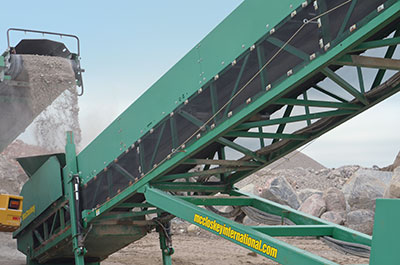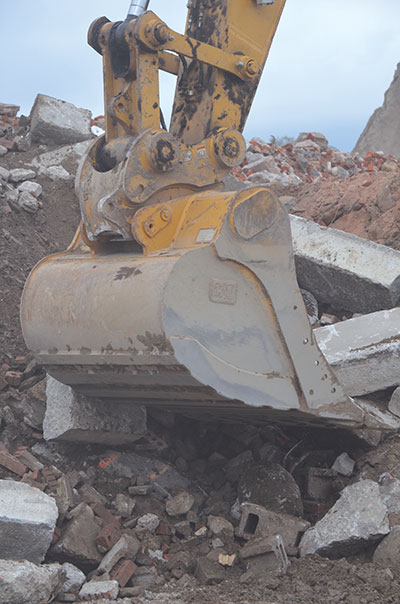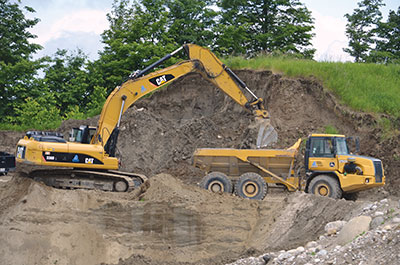
Features
Aggregates
Profiles
Crushing Custom Aggregates
Meeting customer demands means providing diverse options for crushed aggregate products.
July 25, 2013 By Andrew Macklin
As the Greater Toronto Area continues to see a significant growth of the
residential, commercial and transportation infrastructure, aggregate
supplies in the region dry up and new virgin aggregate sources are more
and more difficult to get approved.
As the Greater Toronto Area continues to see a significant growth of the residential, commercial and transportation infrastructure, aggregate supplies in the region dry up and new virgin aggregate sources are more and more difficult to get approved.
 |
|
| DHL has chosen to use McCloskey crushing and conveying equipment at their pits based on the relationship they have formed with them, as well as the service they provide.
|
In the shadow of the burgeoning region, just 90 kilometres north of Toronto’s downtown core, one company is working to provide both virgin aggregate resources and recycled aggregate services thanks to the development of its custom crushing operation. That company is Duivenvoorden Haulage Limited in Innisfil.
When John Duivenvoorden Jr. took over Duivenvoorden Haulage Limited from his mom and dad, John Sr. and Patricia respectively, in 1989, the company had just one dump truck used for hauling construction materials to and from job sites in the Golden Horseshoe Area of Ontario. Now, 24 years later, John Jr. has made the company one of the regional leaders in aggregate production, construction hauling and road building.
Hauling the Foundation
Hauling remains the foundation of John’s growing enterprise despite the many other services his company provides. His fleet has expanded to approximately 30 trucks, hauling aggregate and soil from one of his three active pits to job sites throughout the region, picking up aggregate waste from construction and demolition sites, and providing contracted hauling for a variety of companies.
The three active pits are found within the Barrie/Innisfil area: Hillsdale Pit in Oro-Medonte, Shelburne Pit in Melancthon, and Kneeshaw Pit in Springwater. The three pits provide enough aggregate annually to support both the demands of the contractors they supply and their own construction projects.
“We sell about 1.5 million tonnes of our own product each year,” explains Duivenvoorden. “That represents about 30-40 per cent of our business.”
That product gets hauled to job sites throughout the Golden Horseshoe, extending through the GTA corridor and into the Niagara Region, as well as areas both west and east of DHL’s operation.
Recycling Construction Waste
Working with major construction projects throughout the Toronto area has led DHL to take on cement, concrete and asphalt waste from job sites.
 |
|
| Recycled concrete from local demolition sites is crushed at each of DHL’s three pits.
|
“We do recycling in our gravel pits for the job sites that we work on,” says Duivenvoorden. “At construction jobs, we’ll take both the concrete and the asphalt pieces back to our pit and then we’ll bring in our impactor to make both recycled concrete and asphalt products.”
That product is mixed with virgin aggregate resources from any one of the three pits and used both on their own construction projects and as part of pre-approved aggregate sales to other contractors they supply.
“We blend the products based in to our A gravel specs,” says Duivenvoorden. “We blend back about 10 per cent of the asphalt and put it back in to our A gravel.”
Investing in Equipment
Taking on recycled materials has happened, in part, thanks to DHL’s significant investments in their crushing operation. In the past several years, DHL has invested millions of dollars to update and upgrade their crushing spreads, increasing efficiency and portability.
DHL’s crushing and screening spreads have given them the flexibility to crush a variety of specs, allowing them to meet the demands of a growing number of contractors. Currently, DHL offers 19 different specs and variations of rock and sand products. That includes various sizes of clear and crusher-run limestone, screenings, sands, A gravel and B gravel variations, as well as river and septic stone options.
The versatility of those products has been a result of buying jaw, cone and impact impact-crushing spreads, with screening and conveying systems that make production and stacking viable within any of the three pits. All of those components were also purchased from the same company, McCloskey, whose North American base of operations is located in Peterborough, approximately 120 km east of DHL’s head office.
Running McCloskey equipment exclusively has been a result of the strong relationship that DHL has formed with the company. The close proximity has also helped to reduce parts and service times for all of the crushing, screening and conveying equipment, which has cut downtime significantly for the operation.
“We buy what seems to serve the best purpose for what we do,” explains Duivenvoorden. “Good working relationships are huge to me, and that’s what we have with McCloskey.”
That brand loyalty has also carried over to the other products found in DHL’s operation. The large wheel loaders DHL uses are all Caterpillar machines, while the small wheel loaders they use are all from John Deere. The excavators used both in the pits and on the construction sites are also Caterpillar products, while most of the dozers used are from John Deere. That brand loyalty is also a result of strong relationships built over the years with local distributors.
Crushing Custom Specs
As DHL has grown its custom crushing operation as part of their business, those same strong relationships with the manufacturers, distributors, and other local contractors have paid off. To date, the custom crushing the company has done has been, primarily, for companies in the area needing a particular spec.
 |
|
| DHL sells approximately 1.5 million tonnes of aggregate products each year in addition to what they use for their own construction projects.
|
“The custom crushing we’ve gotten into has been providing granular A for a few local operations like Walker Aggregates,” says Duivenvoorden.
Beyond regional opportunities, new crushing contracts have been obtained by DHL outside of the Golden Horseshoe region where they traditionally operate.
“We’ve been up in northern Ontario in a quartz mine making silicant products for a recycling company, who is selling that product way up north,” he says.
That contract came as a result of a phone call placed to McCloskey from a contractor looking for a company that had a portable operation that could handle the demands of crushing quartz in such a remote area of the province. McCloskey, knowing the equipment that DHL had purchased from them and the solid reputation DHL’s custom crushing operation had built, immediately recommended the company to handle the job.
That’s not the only contract that has come as a result of the reputation of DHL’s operation. The company is working a job site on Manitoulin Island, which helps form the border between Lake Huron and Georgian Bay in Ontario’s Great Lakes.
“The Manitoulin Island business came as a result of word of mouth,” explains Duivenvoorden. “He (the contractor) contacted me thanks to a guy he had talked to that we had done some floating work for, and he knew about the crushing spread we had. So I went to Manitoulin Island and looked at the job and now we’re there crushing it.”
Maintaining the Work
The expansion of the custom crushing work has allowed Duivenvoorden to maintain a strong staff of around 65-70 during peak construction season. He’s able to keep about 40 of those guys year round thanks to snow plowing and snow hauling operations during the winter months. But the past few milder winters have allowed DHL to maintain higher levels of year-round staff, allowing them to make products 12 months of the year.
The company’s pit life helps also to maintain the strong staff working in the operation. Of the three pits they have, two have around 25 years left at the current rate of extraction while the third has about 10 years left. If the amount of recycled products received by DHL increases, which is likely to happen, that pit life could be extended a bit more to help meet current demands.
Thanks to the reputation DHL has gained through their custom crushing work, they will need to look for new aggregate sources in order to continue providing quality rock products for their growing customer base.
Print this page